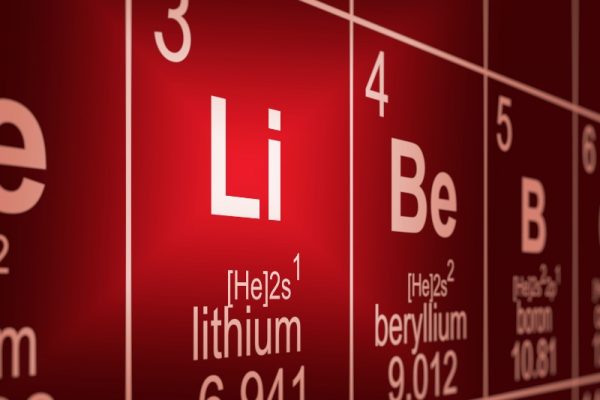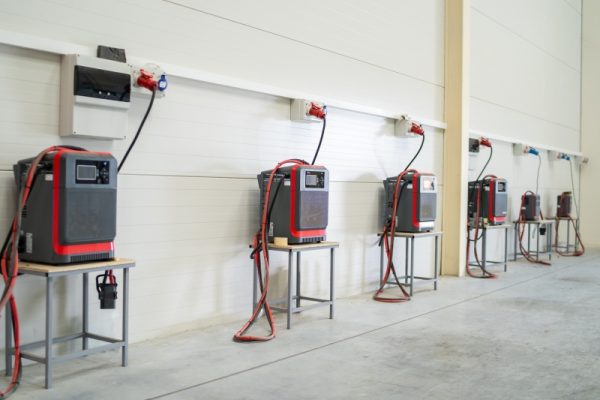Not all forklift batteries are the same.
In the Materials Handling Industry, productivity and efficiency are two important keys to success. There are only so many hours in the day, so whenever a company can find a way to do more in less time, they gain a competitive advantage. For some operations, especially food processing and other multi-shift applications, lithium-ion forklift batteries provide that extra edge by reducing labour costs and improving productivity.
In this article we’ll answer common questions about lithium-ion (L-I) forklift batteries including:
– How long does it take to charge a lithium-ion forklift battery and
– When are lithium-ion forklift batteries worth the extra cost?


Our Guide to Lithium Ion Forklift Batteries
Q: What Applications Benefit Most from Lithium-Ion?
Multi-shift applications such as logistics, manufacturing and food processing) and any other 24/7 material handling operations benefit most from switching to lithium-ion. For these type of operations, li-ion batteries can pay for themselves within a few years.
Operations where forklifts operate in cold environments can also quickly benefit from switching to lithium-ion. lithium-ion forklift batteries can be fast-charged in cold temperatures (even inside freezers) and maintain their capacity in cold temps better than their lead-acid counterparts.
Q: How much does a lithium-ion forklift battery cost?
The average price for a lithium-ion forklift battery is roughly twice the price of a similar lead-acid battery. For that higher upfront price, an operation will save money on:
Energy bills: lithium-ion batteries are 30% more energy-efficient and charge 8x faster than lead-acid batteries
Batteries: your lithium-ion battery will last 2-4x longer than a lead acid battery
Downtime: lithium-ion batteries never need to be swapped out and can be opportunity-charged during operator breaks
Labour costs: lithium-ion forklift batteries do not require maintenance or watering
Productivity: enjoy longer run-times and no decline in performance as the battery discharges
Hazards: li-ion batteries don’t emit harmful fumes or CO2, there’s no risk of acid spills, and you’ll have 70-80 percent fewer batteries to dispose of over time because you won’t be replacing batteries as often.
Real estate: reclaim the area you’re using as a charging room for additional storage
Q: How long does a lithium-ion battery take to charge?
Li-ion batteries can charge throughout the day in 15 or 30 min spurts, or fully charge during a one to two hour continuous session. Compare this to the eight hour charge time plus an additional eight hour cool down time for a lead-acid battery.
Q: How much runtime will I get from a lithium-ion battery?
As with lead-acid batteries, the runtime depends on the application (how much lifting, how much uphill travel). Generally speaking, a lithium-ion battery will last as long as a lead-acid battery – but it charges faster and does not cause a decline in performance as it discharges.
Q: Can a forklift be retro-fitted to use a Lithium-ion battery?
Yes! Conversion is quick and easy. The retro-fit simply requires installing the new battery and adding the charge meter.
Q: What about counterbalance?
Ballast is included within the lithium-ion battery case, so it meets the required minimum battery weight spec.
Even though lithium-ion batteries cost more upfront, they can quickly pay for themselves through reduced operating costs – offering some businesses a long-term competitive advantage. For more information about whether making the switch to lithium-ion might be a smart investment for your operation, contact one of our forklift battery experts online or by phone.
Make the move to lithium now
Reduce Your Carbon Footprint
Li-Ion batteries absorb much more of the energy input, with less waste. They also have the potential to replace old Diesel Counterbalance forklifts, making them the perfect choice for a greener future.
High Performance
Thanks to a greater energy density compared to lead-acid batteries, Li-Ion batteries ensure longer working times, increasing truck availability. They can also last up to four times longer than conventional batteries and can be fully charged within 2 hours.
Longer Service Life
Li-Ion batteries come with a naturally long service life. They can go on for 4,000 full charging cycles with at least 80% residual capacity.

